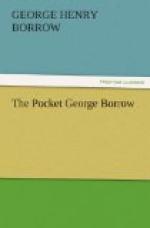Sitting in the swale; and listening
to the swindle of the flail, as it
sounds dub-a-dub on the corn, from
the neighbouring barn.
In requital for which I treated them with a song, not of Romanvile, but the song of ‘Sivord and the horse Grayman.’ I remained with them till it was dark, having, after sunset, entered into deep discourse with a celebrated ratcatcher, who communicated to me the secrets of his trade, saying, amongst other things: ’When you see the rats pouring out of their holes, and running up my hands and arms, it’s not after me they comes, but after the oils I carries about me they comes’; and who subsequently spoke in the most enthusiastic manner of his trade, saying that it was the best trade in the world, and most diverting, and that it was likely to last for ever; for whereas all other kinds of vermin were fast disappearing from England, rats were every day becoming more abundant. I had quitted this good company, and having mounted my horse, was making my way towards a town at about six miles distance, at a swinging trot, my thoughts deeply engaged on what I had gathered from the ratcatcher, when all on a sudden a light glared upon the horse’s face, who purled round in great terror, and flung me out of the saddle, as from a sling, or with as much violence as the horse Grayman, in the ballad, flings Sivord the Snareswayne. I fell upon the ground—felt a kind of crashing about my neck—and forthwith became senseless.
* * * * *
As I was gazing on the prospect an old man driving a peat cart came from the direction in which I was going. I asked him the name of the ravine and he told me it was Ceunant Coomb or hollow-dingle coomb. I asked the name of the brook, and he told me that it was called the brook of the hollow-dingle coomb, adding that it ran under Pont Newydd, though where that was I knew not. Whilst he was talking with me he stood uncovered. Yes, the old peat driver stood with his hat in his hand whilst answering the questions of the poor, dusty foot-traveller. What a fine thing to be an Englishman in Wales!
In about an hour I came to a wild moor; the moor extended for miles and miles. It was bounded on the east and south by immense hills and moels. On I walked at a round pace, the sun scorching me sore, along a dusty, hilly road, now up, now down. Nothing could be conceived more cheerless than the scenery around. The ground on each side of the road was mossy and rushy—no houses—instead of them were peat stacks, here and there, standing in their blackness. Nothing living to be seen except a few miserable sheep picking the wretched herbage, or lying panting on the shady side of the peat clumps. At length I saw something which appeared to be a sheet of water at the bottom of a low ground on my right. It looked far off—’Shall I go and see what it is?’ thought I to myself. ‘No,’ thought I. ’It is too far off’—so on I walked till I lost sight of it, when I repented and thought I would go and see what it was. So I dashed down the moory slope on my right, and presently saw the object again—and now I saw that it was water. I sped towards it through gorse and heather, occasionally leaping a deep drain. At last I reached it. It was a small lake. Wearied and panting I flung myself on its bank and gazed upon it.




